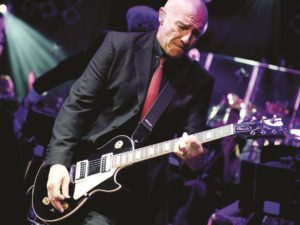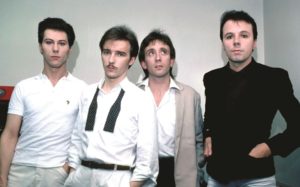The name on the screen for our Zoom call says “James Ure.” But Ure is better known as Midge, a phonetic reversal of the name Jim. The nickname was originally given to him to avoid confusion with Jim McGinlay, the bassist in one of his first bands, Slik.
Slik dissolved, but Midge’s name endured. By the 1980s, after passing through the bands Rich Kids, Thin Lizzy, and Visage, Midge Ure started fronting the English synth-rock band Ultravox. In 1981, they released the album Vienna. Its title track spent four weeks at number two in the U.K. charts, catapulting the band to fame.

Bona fide rock star Midge Ure has been with us, in varying degrees, ever since. On Thursday, Oct. 28, Ure will be performing “Unzoomed & Face to Face” at the Music Room in West Yarmouth. The intimate venue, accommodating 88 people, has been open since Memorial Day weekend. Founded by Brian Serpone, Paul Nelson, and Scott Cornella, the space hosts concerts by both big and lesser-known names six nights a week.
The Scottish-born Ure lives in Bath, Somerset, a hundred miles west of London. “Because of this enforced lockdown, 50 percent of my time is taken up in this little box, writing and recording,” he says in a warm brogue, gesturing to the purple room from which he’s been hosting intimate livestreams. Ure’s upcoming U.S. tour will be his first in-person shows since the beginning of the pandemic.
Ure was born in Cambuslang, just outside Glasgow. “My formative years were in this soon-to-be-demolished slum,” he says. “I lived in a tenement, on derelict, empty streets. Everything was black and white. Any means of escape for me was purely fantasy — it was music, it was imagination, it was dreaming of getting a guitar and standing on stage. That was my lifeline.”
In 1977, the 24-year-old Ure moved to London and joined ex-Sex Pistol Glen Matlock and his band, the Rich Kids, immersing himself in the nascent punk scene. “My first weekend there, I learned three songs with the Rich Kids, and we went out that night and we opened up for the Police,” says Ure. “The support band didn’t show up, so we went and played the three songs I’d just learned. Then, we went to a warehouse party with Sid and Nancy and Billy Idol and the Clash, all these people I’d been reading about. It was all so vibrant and new.”
Things started to get shaky when Ure wanted to introduce a synthesizer. “Half the band hated it,” he says. “They absolutely loathed this thing. But half the band loved it.” After one album, Ure left the Rich Kids with his new instrument and drummer Rusty Egan to form Visage, a studio project fronted by singer Steve Strange. They scored a top ten hit with “Fade to Grey” in 1980.
“I knew there was something magical about the track,” says Ure. “I think maybe there was a moment when we put the French spoken vocal on it, and it just seemed to gel. It all made sense: the atmosphere, the imagery in your head, this lovely European essence to it. It was like icing on the cake, really.”

Visage was a production vehicle for Ure, who drew the logo and came up with the name. “My job was to try and get the music right and create something that wasn’t overtly derivative of anything else,” he says. “To do that, Rusty and I put together our favorite musicians.” One of them was violinist Billy Currie from Ultravox. As it turns out, Ultravox was looking for a new member after singer John Foxx left the band. Egan recommended Ure.
Ure wrote most of the material for Vienna, their first album together. One critic called the title track “pompous but lovable,” which is perhaps the point. “Ultravox was over the top,” says Ure. “There’s something about ‘Vienna’ that sounds huge and bombastic, but it’s not. If you look at the multitrack, it’s very sparse when it starts. It’s the buildup of the vocals that make that chorus the big thing that it becomes. In everyone’s heads, it’s this mega-monstrous thing. There’s definitely something tongue in cheek in the dramatic ending.”
Ure continues to do charitable work through the Band Aid Trust that he started with Bob Geldof. Responding to the Ethiopian famine, Ure and Geldolf wrote and recorded “Do They Know It’s Christmas?” in 1984, earning millions of dollars for relief aid in the process. When Ultravox performed at Live Aid, the concert counterpart at Wembley Stadium, on July 13, 1985, it was in front of 72,000 people and an estimated global TV audience of 1.9 billion.
“Doing something philanthropic was way off my radar,” Ure says. “The whole Band Aid scenario just came out of the blue. I wasn’t expecting to do it, but I found myself immersed in it. It was meant to be a six-month project. Now it’s gone on for 37 years.”
It also indirectly led to Ultravox’s demise. “Live Aid, in a way, took me away from the band for nearly two years, and it was a major part of the split,” he says. “We’d all moved on differently. I felt like I was in an alien band, and I’m sure they felt the same way. We were all pooling in different directions.”
Creatively, lockdown has been a boon for Ure. “I’ve been incredibly busy,” he says, having recently completed an instrumental album of “cinematic, textural, ambient, melodic stuff,” and continuing to host The Space, a daily radio program that explores Ure’s take on classical musical forms.
Creating music is like having kids, says Ure: “You’re responsible for it until the day you die, so you’re forever associated with what you’ve done, good or bad.”
Just a Smidge
The event: Midge Ure in concert
The time: Thursday, Oct. 28 at 8 p.m.
The place: The Music Room, 541 Main St., West Yarmouth
The cost: $35 to $95 at musicroomcapecod.com
